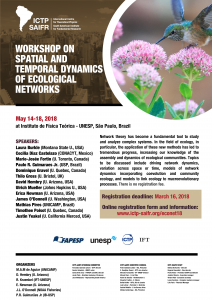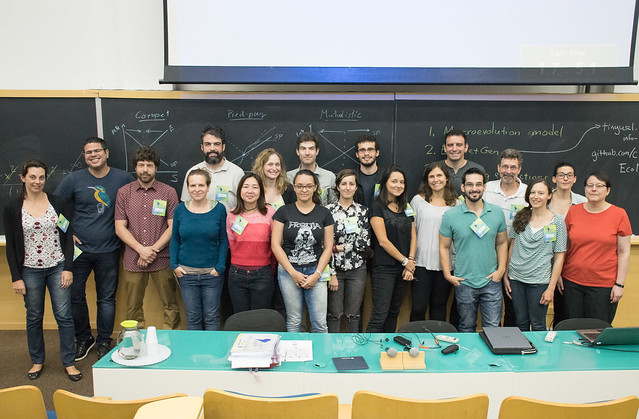Workshop on Spatial and Temporal Dynamics of Ecological Networks
- Dynamics of Ecological Networks
May 14-18, 2018
São Paulo, Brazil
ICTP-SAIFR/IFT-UNESP
![]()
Home
Network theory has become a fundamental tool to study and analyze complex systems. In the field of ecology, in particular, the application of these new methods has led to tremendous progress, increasing our knowledge of the assembly and dynamics of ecological communities. Many questions, however, remain open, especially those requiring the integration of ecological processes that operate over spatial and temporal scales. This workshop will bring together a diverse group of scientists spanning the fields of biology, physics, mathematics and computation to focus on these questions. The group will develop working hypotheses for factors driving network dynamics based on empirical patterns; explore case studies of variation across space or time in ecological networks; develop new models of network dynamics incorporating coevolution and community ecology; develop models to link ecology to macroevolutionary processes.
During the workshop participants will be organized in groups to work on specific projects of common interest. There will be one introductory talk every morning, before the groups start working, and one more technical talk in the afternoon. There is no registration fee.
Organizers:
- Marcus A.M. de Aguiar (IF-UNICAMP, Brazil)
- David Hembry (Department of Ecology and Evolutionary Biology, University of Arizona, USA)
- Roberto Kraenkel (IFT-UNESP, Brazil)
- Erica Newman (School of Natural Resources and the Environment, University of Arizona, USA)
- James Lawrence O’Donnell (National Research Council Postdoctoral Research Associate, under contract to Northwest Fisheries Science Center, NOAA Fisheries, Seattle USA)
- Paulo R. Guimarães Jr (Departamento de Ecologia, Instituto de Biociências, USP, São Paulo)
Invited Speakers
- Laura Burkle (Montana State University, USA): Untangling drivers of plant-pollinator network assembly across environmental, species-pool, and wildfire gradients
- Cecilia Diaz Castelazo (CONACYT, Mexico)
- Marie-Josée Fortin (University of Toronto, Canada): Generalized network approach to model species range expansion and disease spread in fragmented landscapes
- Paulo R. Guimaraes Jr. (University Sao Paulo, Brazil)
- Dominique Gravel (University of Quebec, Canada): Simple rules for complex spatial food web dynamics
- Thilo Gross (University of Bristol, UK)
- David Hembry (University of Arizona, USA): Phylogenies, biogeography, and networks reveal the evolutionary dynamics of specialized mutualisms
- Ulrich Mueller (Johns Hopkins University, USA)
- Erica Newman (School of Natural Resources and the Environment, University of Arizona, USA): The Maximum Entropy Theory of Ecology: an information theoretic approach to macroecology
- James O’Donnell (University of Washington, USA): Extinction cascades in mutualistic networks
- Mathias Pires (UNICAMP, Brazil)
- Timothee Poisot (University of Quebec, Canada)
Poster
Program & Abstracts
WORKSHOP PROGRAM: PDF updated on May 7, 2018
Click on each “Seminar” to watch the talks.
LIST OF ABSTRACTS: updated on May 7, 2018
SEMINARS:
- Laura Burkle (Montana State University, USA): Untangling drivers of plant-pollinator network assembly across environmental, species-pool, and wildfire gradients
- Marie-Josée Fortin (University of Toronto, Canada): Generalized network approach to model species range expansion and disease spread in fragmented landscapes
- Dominique Gravel (University of Quebec, Canada): Simple rules for complex spatial food web dynamics
- David Hembry (University of Arizona, USA): Phylogenies, biogeography, and networks reveal the evolutionary dynamics of specialized mutualisms
- Erica Newman (School of Natural Resources and the Environment, University of Arizona, USA): The Maximum Entropy Theory of Ecology: an information theoretic approach to macroecology
- James O’Donnell (University of Washington, USA): Extinction cascades in mutualistic networks
SHORT TALKS:
- Carine Emer (UNESP-Rio Claro, Brazil): Seed-dispersal interactions in fragmented landscapes – a metanetwork approach
- Cecília Andreazzi (Fundação Oswaldo Cruz, Brazil): Mechanisms driving the evolution of species-rich interaction networks
Photos
Additional Information
- Registration: ALL participants should register. The registration will be on May 14 at the institute from 8:30 to 9:30 am. You can find arrival instructions at http://www.ictp-saifr.org/how-to-reach-us/
- List of Participants Updated on May 10.
- You can find arrival instructions at http://www.ictp-saifr.org/?page_id=195
- Poster presentation: Participants who are presenting a poster MUST BRING THE POSTER PRINTED. The poster size should be at most 1,5m x 1m.
- Hotel Recomendations: Click here

